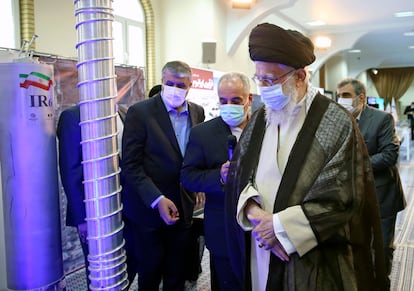Hardline wing of Iranian regime pushes for Tehran to equip itself with atomic weapons
The threat of a major Israeli attack is fueling debate over changing the country’s military doctrine, which bans such devices


On October 5, the earth trembled in Semnan, some 200 kilometers (125 miles) east of Tehran. It was a simple earthquake, recorded by the U.S. Geological Survey, but social media users began to speculate about an alleged nuclear test by Iran. On October 9, the English-language newspaper Tehran Times, considered the unofficial mouthpiece of the hardline wing of the Iranian regime, headlined its front page “Demand for nuclear weapons grows,” in a report in which it quoted Ali, a 25-year-old Iranian nurse, who expressed his disappointment that the tremor had not actually been an atomic test. That same day, a letter from 39 conservative parliamentarians addressed to the Supreme National Security Council was published, in which they requested the revision of the national defense doctrine, which prohibits the manufacture of atomic weapons, in order to “strengthen the defensive deterrence” of their country. The document cited the “Zionist regime.”
Since Iran launched around 180 missiles against Israeli territory on October 1, in response to the assassinations of Hamas leader Ismail Haniyeh in Tehran and Hezbollah leader Hassan Nasrallah in Beirut, the country has been awaiting the announced revenge of its Israeli nemesis. This horizon and the possibility of the war spreading throughout the Middle East — with Washington’s foreseeable support for its Israeli ally — has stayed the hand that the moderate Iranian President Masud Pezeshkian had extended to the West on the nuclear issue when he took office in July.
On September 16, Pezeshkian said he was ready to hold direct talks with the United States to revive the 2015 agreement that allowed international oversight of his country’s atomic program to ensure that Tehran did not build nuclear weapons. This agreement, or a similar one, will help ease the sanctions that are stifling Iran’s economy, something the authorities consider essential to quell citizen discontent with the regime, which was evident in the protests that broke out in 2022. Tens of thousands of citizens then took to the streets after a young woman who had been arrested for wearing her headscarf in an “inappropriate” manner, Yina Mahsa Amini, died in police custody.
The 39 signatories of the letter calling for a change in military doctrine belong to the Coalition Council of Islamic Revolution Forces, an ultra-conservative faction loyal to Iran’s supreme leader, Ayatollah Ali Khamenei, who has the final say on the nuclear issue. They represent the hardline wing, whose proposals often reflect the orientations of the regime’s leadership, especially Khamenei.
These hawks have traditionally opposed any agreement with the West, but their voices are now not the only ones being heard in Iran in favour of the country acquiring nuclear weapons. “There is an increasingly loud chorus in Tehran [demanding] the acquisition” of such weapons, Naysan Rafati, senior analyst for Iran at the International Crisis Group think tank, said via email from the U.S. Another expert — who lives in Iran and spoke to this newspaper on condition of anonymity — added: “A growing number of Iranians are calling for a review of the defense doctrine in the face of threats from Israel. This public debate means that something is moving.”
Even the grandson of Ayatollah Ruhollah Khomeini, the founder of the Islamic Republic, has weighed in on the controversy. Moderate cleric Hassan Khomeini, who supports Pezeshkian, “alluded a few days ago in an interview to the need to increase Iran’s sources of deterrence, which everyone saw as a clear reference to a change in Iran’s nuclear program,” stresses the analyst from Tehran, who maintains that right now “the idea of a nuclear agreement or any other kind with the U.S. has been ruled out.”
Against the backdrop of the escalation of the Middle East conflict, the Iranian president has gone from reaching out to the U.S. on the nuclear issue to harshly criticising Washington and, more significantly, the European Union, even though Brussels attempted to rescue the nuclear pact after the U.S. broke it in 2018. He has also played up his closeness to the Kremlin. Last Friday, before his first meeting with Vladimir Putin at a regional forum in Turkmenistan, Pezeshkian said that Israel violates international law because it has “the support of the U.S. and the EU.”
A “political” issue
The Iranian Embassy in Madrid assured this newspaper that the country’s official position on the nuclear issue has not changed. Tehran has always denied that its atomic programme has military purposes and a fatwa (a ruling point on Islamic law) issued by Khamenei prohibits such weapons, considering them contrary to Islam. The agreement signed in 2015 — the Joint Comprehensive Plan of Action with the U.S., France, the United Kingdom, Russia, China, Germany, and the EU — obliged Tehran not to enrich uranium above 3.75% purity and to submit to a strict inspection regime. The counterpart was the lifting of international sanctions. In 2018, when Iran was strictly complying with the stipulations, Donald Trump unilaterally broke the pact and reimposed sanctions. Ali, the nurse quoted by the Tehran Times, said: “I don’t understand why we haven’t just developed nuclear weapons, as we are already paying the price for it.”
After the agreement was broken, Iran no longer considered itself obliged to respect it. In 2021, it began enriching uranium to 60% purity. A report by the International Atomic Energy Agency (IAEA) in February indicated that the country has accumulated more than five tons of enriched uranium, enough to make two nuclear bombs if it reached a purity of 90%. Several Western intelligence services estimate that Tehran would need “between six months and a year” to manufacture atomic weapons.
Whether Iran will obtain such weapons is “more a political than a technical issue,” said the analyst speaking from Tehran, who believes that this debate could be “a trial balloon” aimed at the Iranian public and the international community. This “warning to contain the almost certain retaliation from Israel” is one of the factors that could be behind this pressure from the hardline wing of the regime, said Rafati. Israel — which is assumed to have nuclear weapons although it does not openly admit it — considers that an Iran with atomic capabilities would represent a threat to its existence.
Another reason Rafati cites is “the degradation of Hamas and Hezbollah” — members of the so-called Axis of Resistance led by Tehran against Israel and the U.S, and in particular Hezbollah, which serves Iran “as a deterrent to attacks on Iranian territory.” With those groups “decimated” by the wars in Gaza and Lebanon, concurs Barbara Slavin, a researcher at the Stimson Center, Iran “feels increasingly pressured to find another way to deter Israel from attacking it.”
“Iran has made it clear that if Israel, with or without the U.S., attacks its nuclear facilities, it will abandon the Nuclear Non-Proliferation Treaty and build atomic weapons.” If Israel “refrains from attacking these facilities, Tehran will probably try to make its response proportional,” Slavin stresses.
The demand from the hardline wing of the Islamic Republic has another interpretation, says analyst Daniel Bashandeh. Nuclear policy “has always been used to condition internal dynamics and create cohesion within the regime.” The authorities are now trying to “close ranks and regain their credibility by claiming that they can equip themselves with such weapons.” The intended recipient of this message is not only Israel, nor the U.S., nor Iran’s allies such as Hamas and Hezbollah. It is also “the Iranian population itself.”
Sign up for our weekly newsletter to get more English-language news coverage from EL PAÍS USA Edition
Tu suscripción se está usando en otro dispositivo
¿Quieres añadir otro usuario a tu suscripción?
Si continúas leyendo en este dispositivo, no se podrá leer en el otro.
FlechaTu suscripción se está usando en otro dispositivo y solo puedes acceder a EL PAÍS desde un dispositivo a la vez.
Si quieres compartir tu cuenta, cambia tu suscripción a la modalidad Premium, así podrás añadir otro usuario. Cada uno accederá con su propia cuenta de email, lo que os permitirá personalizar vuestra experiencia en EL PAÍS.
¿Tienes una suscripción de empresa? Accede aquí para contratar más cuentas.
En el caso de no saber quién está usando tu cuenta, te recomendamos cambiar tu contraseña aquí.
Si decides continuar compartiendo tu cuenta, este mensaje se mostrará en tu dispositivo y en el de la otra persona que está usando tu cuenta de forma indefinida, afectando a tu experiencia de lectura. Puedes consultar aquí los términos y condiciones de la suscripción digital.








































